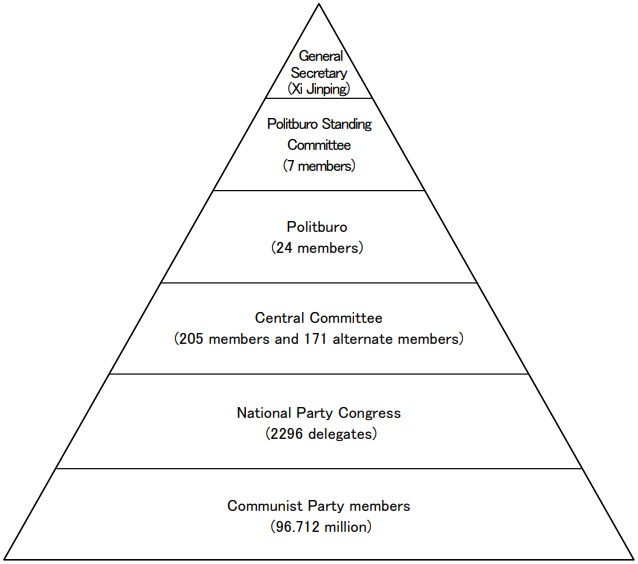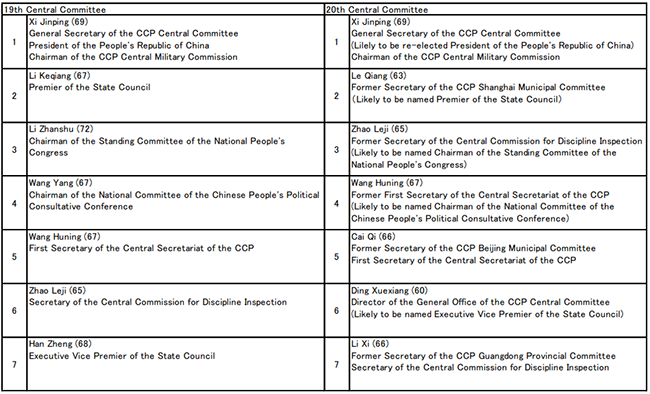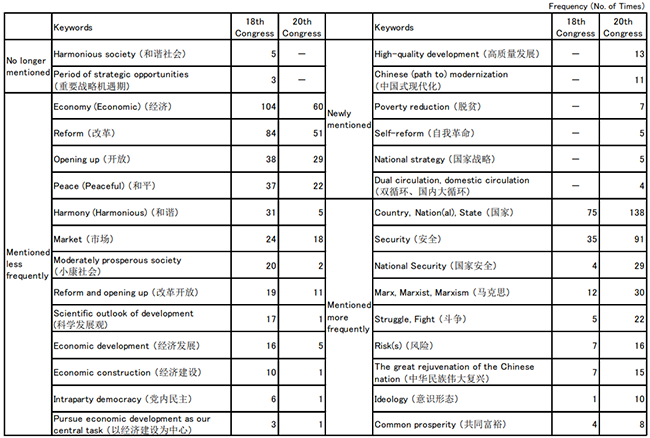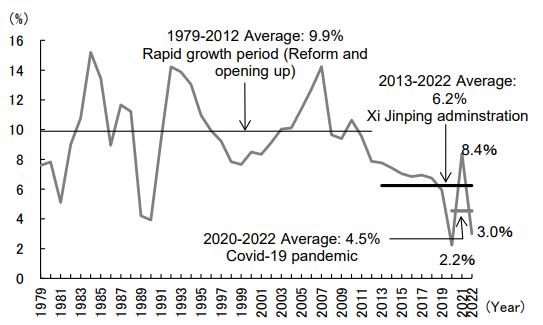I. Introduction
In China, General Secretary Xi Jinping, who came into power in 2012, entered his third term after the 20th National Congress of the Communist Party of China ("Party Congress") held in October 2022. This was accompanied by a reshuffle of the Politburo and its core, the Standing Committee.
Over the past decade, the Deng Xiaoping line centering on reform and opening up has given way to the Xi Jinping line that aims for "the great revival of the Chinese nation through a Chinese path to modernization." The differences between the two policies are not limited to economic aspects, but also extend to politics and diplomacy. In terms of the economy, under the Deng Xiaoping line, the government aimed for high growth through market-oriented reform and opening up to the outside world and tolerated widening inequality based on the "get rich first policy." In contrast, the Xi Jinping administration emphasizes the role of the government and domestic economic flows, with the goal of achieving common prosperity. On the political front, under the Xi Jinping administration, the term and retirement system for leaders and the collective leadership system have been virtually abolished, and power is now concentrated in the hands of the general secretary. On the diplomatic front, since the Xi Jinping administration came to power, China has changed from being a supporter of the existing international order to a challenger, and against this backdrop, friction between the U.S. and China has intensified.
Under the new leadership, the shift from the Deng Xiaoping line to the Xi Jinping line is expected to accelerate. This will mean a further retreat from market-oriented reform and opening to the outside world in China. As a result, the rate of economic growth will continue to decline.
II. Consolidation of Xi Jinping’s One-man Rule
China's political system is based on one-party rule by the Communist Party of China (CCP). The leadership of the CCP monopolizes the top appointments in the political institutions and forms the center of power in China. The CCP has 96,712,000 members (as of the end of 2021), and at the top of the hierarchy is the Central Committee, headed by the general secretary, and in particular the Politburo and its Standing Committee (Figure 1). The members of the Central Committee are elected by the Party Congress, which meets every five years, from which the members of the Politburo and its Standing Committee are elected. Compared to the previous 19th term, the number of Standing Committee members of the Politburo has remained unchanged at seven in this 20th term, while the number of members of the Politburo has decreased by one to 24.

General Secretary Xi Jinping has been elected for a third term, and the four retiring members of the Standing Committee include Premier Li Keqiang and Wang Yang, chairman of the National Committee of the Chinese People's Political Consultative Conference, who are considered reformists. On the other hand, the four new members of the Standing Committee, Li Qiang, Cai Qi, Ding Xuexiang, and Li Xi, are all considered close associates of Xi Jinping (Table 1). Hu Chunhua, who was widely considered a strong candidate for the Standing Committee, if not for premiership, was demoted and lost his seat in the Politburo. The new leadership has no clear candidate to succeed General Secretary Xi Jinping, and his reign is likely to extend beyond his third term.
- The 20th Central Committee vs. the 19th Central Committee

[Click to enlarge]
Source: Compiled by the author based on Xinhua News Agency and various other sources.
While the appointment of the president, the premier, and other top officials must wait until the National People's Congress and the National Political Consultative Conference ("the two sessions") in March 2023, the CCP's leadership appointments have already been announced. General Secretary Xi Jinping continues to serve as chairman of the Central Military Commission, while Cai Qi (former secretary of the CCP Beijing Municipal Committee) has been named first secretary of the Central Secretariat of the CCP, and Li Xi (former secretary of the CCP Guangdong Provincial Committee) has been named secretary of the Central Commission for Discipline Inspection. Judging from the announced hierarchy of the Standing Committee of the Politburo, after the "two sessions" in March 2023, General Secretary Xi Jinping is expected to be re-elected president of the People's Republic of China, Li Qiang (former secretary of the CCP Shanghai Municipal Committee) is likely to be named premier of the State Council, Zhao Leji (former secretary of the Central Commission for Discipline Inspection) is likely to be named chairman of the Standing Committee of the National People's Congress, Wang Huning (former first secretary of the Central Secretariat of the CCP) is likely to be named chairman of the National Committee of the Chinese People's Political Consultative Conference, and Ding Xuexiang (director of the General Office of the CCP Central Committee) is expected to become the executive vice premier of the State Council).
Li Qiang, who is almost certain to become the next premier, is a subordinate of General Secretary Xi Jinping from his time as head of Zhejiang Province and enjoys his trust. While it is customary for the premier to be chosen from among those who have served as deputy premiers, Li Qiang has only provincial experience, and his skills as premier are unknown.
In the area of the economy, Vice Premier Liu He, Guo Shuqing, secretary of the Party Committee of the People's Bank of China (who also serves as chairman of the Banking and Insurance Regulatory Commission) and Governor Yi Gang of the People’s Bank of China have already been removed from the Central Committee list (including alternate members) and are expected to be replaced after the National People's Congress in March 2023. The new leadership will not find anyone as knowledgeable on economic policy as they are.
III. Policy Directions Indicated by the Xi Jinping Report at the Party Congress
With the one-man rule of General Secretary Xi Jinping firmly established, where does he intend to lead China with this enormous power? To answer this question, the report of General Secretary Xi Jinping at the 20th Party Congress (hereinafter referred to as the “Xi Jinping Report”) can be used as a reference. Let us examine some keywords from the Xi Jinping Report and compare them with the report of General Secretary Hu Jintao at the 18th Party Congress in 2012 (Table 2).
- Comparison with the 18th Party Congress Report (Hu Jintao, November 2012)

[Click to enlarge]
1. Based on the full text of the Reports of the two Congresses (Chinese version) released by the Xinhua News Agency.
2. The 18th Congress Report and the 20th Congress Report have about 29,000 and 32,500 Chinese words, respectively.
Source: Compiled by the author based on Xinhua News Agency information.
In the Hu Jintao Report, expressions related to economics such as "economic development," "economic construction," and "reform and opening up" were prominent. In contrast, the Xi Jinping Report emphasizes "national security," "the great rejuvenation of the Chinese nation," and "ideology" with a strong political flavor.
Regarding national security, General Secretary Xi Jinping, in his report to the 20th Party Congress, demonstrated his position that "national security is the bedrock of national rejuvenation and social stability is a prerequisite for building a strong and prosperous China." In order to strengthen national security capabilities, he said, "We will resolutely safeguard the security of China's state power, systems, and ideology and build up security capacity in key areas. We will ensure the security of food, energy, and resources as well as key industrial and supply chains. We will strengthen our capacity to ensure overseas security and protect the lawful rights and interests of Chinese citizens and legal entities overseas. We will safeguard China's maritime rights and interests and resolutely defend our country's sovereignty, security, and development interests. We will enhance our capacity to prevent and mitigate major risks and will remain on high alert against systemic security risks. We will crack down hard on infiltration, sabotage, subversion, and separatist activities by hostile forces.”
Regarding the great rejuvenation of the Chinese nation, the Xi Jinping Report pledges that "From this day forward, the central task of the Communist Party of China will be to lead the Chinese people of all ethnic groups in a concerted effort to realize the Second Centenary Goal of building China into a great modern socialist country in all respects and to advance the rejuvenation of the Chinese nation on all fronts through a Chinese path to modernization." It also states “Resolving the Taiwan question and realizing China's complete reunification is ... a natural requirement for realizing the rejuvenation of the Chinese nation (Note 1)."
Regarding ideology, the Xi Jinping Report emphasizes that Marxism is the fundamental guiding ideology upon which the Party and the country are founded and thrive. It also emphasizes that the foundational system for ensuring the guiding role of Marxism in the ideological domain must be upheld, and that the basic tenets of Marxism must be integrated with China's specific realities and fine traditional culture.
In the area of the economy, keywords such as "high-quality development," "domestic circulation," "common prosperity," and "Chinese path to modernization" (hereinafter referred to as "Chinese modernization"), which encompasses all of the above, are attracting attention.
According to the Xi Jinping Report, Chinese modernization is socialist modernization pursued under the leadership of the Communist Party of China. It contains elements that are common to the modernization processes of all countries, but it is more characterized by features that are unique to the Chinese context.
The five characteristics of "Chinese modernization" stated in the Xi Jinping Report, as summarized below, seem to be well-balanced.
(1) It is the modernization of a massive population.
(2) It is the modernization of common prosperity for all.
(3) It is the modernization of material and cultural-ethical advancement.
(4) It is the modernization of harmony between humanity and nature.
(5) It is the modernization of peaceful development.
Nine essential requirements of Chinese modernization are also listed in the Xi Jinping Report. They can be summarized as follows.
(1) Upholding the leadership of the Communist Party of China
(2) Upholding socialism with Chinese characteristics
(3) Pursuing "high quality development"
(4) Developing whole-process people's democracy
(5) Enriching the people’s cultural lives
(6) Achieving common prosperity for all
(7) Promoting harmony between humanity and nature
(8) Encouraging building a human community with a shared future
(9) Creating a new form of human advancement
In the Xi Jinping Report, pursuing high-quality development is positioned as the first and greatest responsibility in building a modern socialist country in all respects. In order to realize this, the country must adhere to a development concept that features "innovation, coordination, green, openness, and sharing," continue reform to develop the socialist market economy, promote high-standard opening up, and accelerate efforts to foster new patterns of development that focus on the domestic economy and that features positive interplay between domestic and international economic flows (Note 2). Specifically, the implementation of the strategy to expand domestic demand must be integrated organically with the efforts to deepen supply-side structural reform; the dynamism and reliability of the domestic economy must be boosted while engaging at a higher level in the global economy; and action to build a modernized economy must be accelerated. Total factor productivity must be raised, China’s industrial and supply chains must become more resilient and secure, and integrated urban-rural development must be promoted to effectively upgrade and appropriately expand China’s economic output.
The Xi Jinping Report also points out the need to improve the system of income distribution in order to realize common prosperity for all. Specifically, it mentions the following:
- (1)Maintain distribution according to work done as the mainstay with multiple forms of distribution existing alongside it, and build an institutional framework under which primary (market-driven), secondary (government-driven, such as fiscal and social security), and tertiary distribution (guided by morality, such as private donations and public utilities) operate.
- (2) Raise the share of personal income in the distribution of national income and give more weight to work remuneration in the primary distribution. We will ensure more pay for more work and encourage people to achieve prosperity through hard work. We will promote equality of opportunity, increase the incomes of low-income earners, and expand the size of the middle-income group.
- (3) Improve the policy system for distribution based on factors of production, explore multiple avenues to enable low- and middle-income groups to earn more from production factors, and increase the property income of urban and rural residents through more channels.
- (4) Enhance the roles of taxation, social security, and transfer payments in regulating income distribution. We will improve the personal income tax system and keep income distribution and the means of accumulating wealth well-regulated. We will protect lawful income, adjust excessive income, and prohibit illicit income. We will provide guidance and support for enterprises, social organizations, and individuals who have the desire and ability to participate actively in public-interest initiatives.
The assertion that the CCP's mission is to promote the great rejuvenation of the Chinese nation through Chinese modernization has raised concerns in some Western countries. For example, among the nine essential requirements of Chinese modernization, "upholding the leadership of the CCP," "upholding socialism with Chinese characteristics," and "developing whole-process people's democracy" are often perceived as evidence of China’s singularity. It is also suspected that "encouraging building a human community with a shared future" refers to China's attempt to change the existing world order, and that "creating a new form of human advancement" refers to China's attempt to export its ideology and development model.
Against the backdrop of deepening conflicts not only on the economic front but also on the political and ideological fronts, China is experiencing increasing friction with the U.S. and its allies. In fact, in its National Security Strategy released on October 12, 2022, the U.S. Biden administration has positioned China as "the only competitor that has both the will and the capability to change the international order," and has indicated its determination to win the competition with China through cooperation with its allies and other measures.
IV. From the Deng Xiaoping Line to the Xi Jinping Line
In order to forecast the direction of future policy, it is necessary to review not only the vision expressed by General Secretary Xi Jinping, but also the specific measures that he has undertaken to date. In retrospect, during the 10 years of the Xi Jinping administration, the Deng Xiaoping line centering on reform and opening up has been fading and giving way to the Xi Jinping line, which aims for "the great rejuvenation of the Chinese nation through Chinese modernization." This shift has not been limited to the economic sphere, but has extended to politics, diplomacy and military affairs, and the Hong Kong and Taiwan issues.
First, in terms of the economy, the reform and opening-up initiative centering on marketization and globalization, has been rolled back.
- (1) Regarding economic growth, under the Deng Xiaoping line, China aimed to expand the size of its economy through high growth. In contrast, since the Xi Jinping administration came to power, it has pursued “high-quality development.”
- (2) Regarding the role of markets and government, under the Deng Xiaoping line, the role of markets in resource allocation was emphasized and the focus of economic reform was marketization reform. In contrast, the Xi Jinping administration has emphasized the role of the government in resource allocation, particularly through the implemetation of industrial policy and the promotion of innovation.
- (3) Regarding income distribution, under the Deng Xiaoping line, the government prioritized economic development and allowed disparities to widen based on the "get rich first policy." In contrast, the Xi Jinping administration has been focusing on poverty eradication and aiming for "common prosperity" in order to correct the disparity.
- (4) Regarding the ownership system, under the Deng Xiaoping line, the government promoted the exit of state-owned enterprises and the development of private enterprises through privatization of state-owned enterprises as part of market-oriented reform. In contrast, the Xi Jinping administration has fostered large, internationally competitive state-owned enterprises while tightening regulations on private enterprises. Against this backdrop, the phenomenon of "advance of the state sector, retreat of the private sector" has become more pronounced.
- (5) Regarding opening up to the world, China long followed the Deng Xiaoping line, maintaining good relations with Western countries and promoting economic globalization through accession to the WTO and other measures. In contrast, in preparation for a decoupling with the United States, the Xi Jinping administration has been promoting a "dual circulation strategy" that seeks to reduce China’s dependence on international economic flows and focus on domestic economic flows.
In addition, on the political front, under the Deng Xiaoping line, from the lesson learned from the Cultural Revolution, a term of office system of up to two 5-year terms and a mandatory retirement age of 68 years were both implemented for the CCP leadership, and a collective leadership system was established with the Standing Committee of the Politburo at the center. In contrast, as General Secretary Xi Jinping, at age 69, was elected for a third term, the term-limit system and mandatory retirement age were effectively abolished, allowing for a lifetime system. Power has also become concentrated in the hands of the general secretary.
Furthermore, in terms of diplomacy and military affairs, until the Hu Jintao administration (2002-2012), China pursued a strategy of "hide one's claws and bide one's time," while at the same time making use of the existing international order and striving to create a peaceful international environment. In contrast, since the Xi Jinping administration came to power, assertiveness has come to the forefront and a strong diplomatic stance has become prominent. As symbolized by the promotion of the "Belt and Road" initiative, China is seeking to establish a regime of international cooperation on its own terms. It is also strengthening its military power through the modernization of its national defense and armed forces, and its goal of "building the People's Liberation Army into a world-class military" is now clearly stated in the revised CCP Constitution.
As for the Hong Kong/Taiwan issue, the "one country, two systems" policy has been applied to Hong Kong since its return to Chinese sovereignty in 1997 and the Chinese government promised the same policy would also apply to Taiwan.” However, following the implementation of the National Security Law of Hong Kong in 2020, the emphasis has shifted to “one country” rather than “two systems.” In addition, while the principle of “rule of Hong Kong by Hong Kong people” has been maintained, a new condition of "rule of Hong Kong by patriots" has been added. Regarding the Taiwan issue, the Xi Jinping administration has taken a more hardline stance, with the Xi Jinping Report declaring that China has no intention of renouncing the use of force, and the revised CCP Constitution pledging China’s right to suppress Taiwan independence.
Thus, the shift from the Deng Xiaoping line to the Xi Jinping line is well underway. After the 20th Party Congress and under the new leadership, the pace is expected to accelerate further.
V. Return to the Reform and Open Door Policy as a Precondition for Economic Recovery (Note 3)
China's economy grew at a high average annual rate of 9.9% over the 34 years (1979-2012) from the time the country switched to a reform and open-door policy until the Xi Jinping administration came to power. However, during the ten years under the Xi Jinping administration, the average growth rate has declined to 6.2% (Figure 2). This is partly due to the declining birthrate and the aging of the population and the effects of the COVID-19 pandemic, as well as the deterioration of the internal and external environment resulting from the retreat from reform and opening up. Without a return to the reform and open-door policy, it will be difficult for China's economy to regain its vitality.

The original text in Japanese was posted on December 27, 2022.


